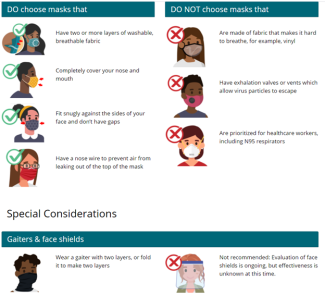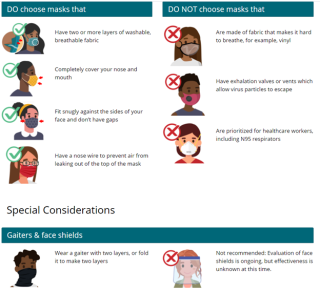The SARS-CoV-2 virus spreads easily and sustainably among people. Therefore, in addition to practicing physical distancing, the college expects members of the college community to engage in excellent hand hygiene and sanitary practices, and protect themselves and others through the use of face coverings and other appropriate personal protective equipment when needed.
Personal Hygiene and Protection
Hand Hygiene and Sanitary Practices
Ithaca College expects members of the college community to practice excellent hand hygiene and sanitary practices to protect each other and help minimize the spread of the SARS-CoV-2 virus. This includes:
- Wash your hands often with soap and water for at least 20 seconds especially after you have been in a public place, or after blowing your nose, coughing, or sneezing (please cover your mouth and nose with a tissue when coughing or sneezing, throwing used tissues in the trash, and, when a tissue is not available, covering with the elbow, not hands).
- It’s especially important to wash:
- Before eating or preparing food
- Before touching your face
- After using the restroom
- After leaving a public place
- After blowing your nose, coughing, or sneezing
- After handling your mask
- After changing a diaper
- After caring for someone sick
- After touching animals or pets
- If soap and water are not readily available, use a hand sanitizer that contains at least 60% alcohol. Cover all surfaces of your hands and rub them together until they feel dry.
- Avoid touching your eyes, nose, and mouth with unwashed hands.
Availability of Hand Sanitizer
Wall-mounted hand sanitizer dispensers, using an alcohol-based hand sanitizer containing at least 60% alcohol are located in strategic locations throughout campus (typically near building entrances).
Please be advised that hand washing is generally considered more effective than hand sanitizer. Hand sanitizer should only be used when hand washing is not possible or practical. We recommend that individuals obtain and carry with them their own supply of hand sanitizer for personal use.
Face Coverings
Face coverings are recommended by the Centers for Disease Control and Prevention to slow the spread of COVID-19. Face coverings are effective at capturing respiratory droplets from individuals reducing the likelihood of person-to-person transmission. Replacement face coverings are available for purchase at the Campus Store.
Personal face coverings can be used as well, but are recommended to comply with Centers for Disease Control and Prevention guidelines. Acceptable face coverings may include, but are not limited to, cloth-based face coverings or surgical masks.
Proper Use of Face Coverings
Face coverings should be worn to cover both your nose and your mouth and should be tied and secured behind your head or both elastic bands should be secured behind your ears. Please familiarize yourself with the guidance from the Centers for Disease Control and Prevention on how to properly wear and take off your face covering.
Other Types of Personal Protective Equipment
The Office of Environmental Health and Safety identifies situations where more significant personal protective equipment (PPE) may be required for students or employees. For example:
Gloves: Gloves are not required for disinfecting work stations. Gloves are mainly recommended for individuals working with chemicals (i.e., facilities personnel) or where close physical contact between individuals is required/exposure to bodily fluids may occur (i.e., athletic trainers, dining, Hammond Health Center, or clinic spaces such as occupational therapy, physical therapy, and likely some other disciplines). In such instances, the College will provide gloves as needed.
Plexiglass: Plexiglass barriers are installed in high transaction, forward-facing environments such as the IT Help Desk, Student Financial Services, Department front offices, and dining services.
Face Shields and Gowns: Face shields and gowns are not required in most circumstances. In instances where the college determines that they are required, the college will provide face shields or gowns as needed.
Individuals who require additional PPE will receive the appropriate equipment and receive training to use it properly.


